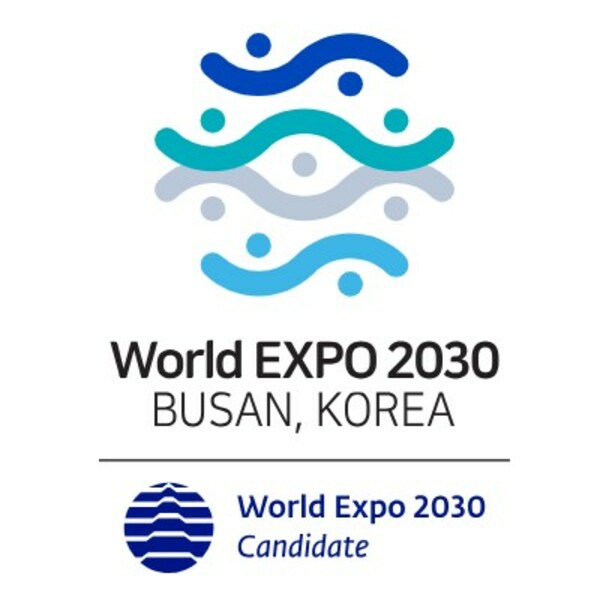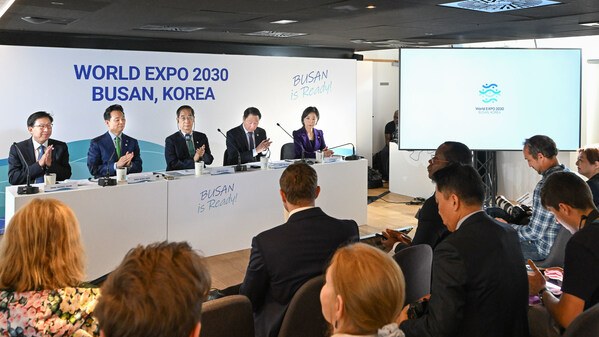 |
PARIS and BUSAN, South Korea, Oct. 9, 2023 /PRNewswire/ — As the date for the selection of the host country for the World Expo 2030 has been announced for November 28, Busan, the second-largest city in Republic of Korea after Seoul, wishes to reaffirm its desire to host this unique event more than ever. Korea aims to turn the World Expo 2030 Busan into a significant milestone that shifts the paradigm of the international community from competition to solidarity by offering unique experiences for global citizens to share and explore various ideas, rather than intensifying competition in the fields of science, technology and cutting-edge industries.

World Expo 2030 Busan representatives, gathered today in Paris, have jointly addressed the audience to provide new insights into the project. From left to right: Park Heong-joon, Mayor of Busan Metropolitan City; Jang Sung-min, Special Envoy of the President of the Republic of Korea; Han Duck-soo, Prime Minister of the Republic of Korea and Co-chair of the Bid Committee; Chey Tae-won, Chairman of SK and KCCI (Korean Chamber of Commerce & Industry) and Co-chair of the Bid Committee; Oh Young-ju, Vice Minister of Foreign Affairs.
For the 2030 edition of the World Expo, Busan aims to engage in dialogue and reflection on the theme “Transforming Our World, Navigating Towards a Better Future,” at the intersection of technology, humanity, and the environment.
A candidacy that looks into the future
“Transforming Our World, Navigating Towards a Better Future” is the theme proposed by Busan for its bid to host the World Expo 2030. A theme rooted in the identity of South Korea, which has undergone significant transformation over the past century, overcoming war, national divisions, and poverty. Today, it is one of the world’s largest economies. Having transformed from a developing nation to an advanced one, Korea now aspires to solidify its position as a global pivotal state for freedom, peace, and prosperity – a fundamental cornerstone of Korea’s diplomacy. Situated at the heart of this remarkable transformation, Busan is a gateway to a better future and reflects the essence of the World Expo itself. Through this theme, Busan places great emphasis on conveying a collective message of hope and responsibility.
As the United Nations member states adopted the 2030 Agenda, an ambitious sustainable development program by 2030, the World Expo in Busan has a major role to play in assessing progress on environmental matters and continuing the collective effort for a more sustainable future.
“We are in a key transition period towards a more sustainable future, which involves collective responsibility to achieve the sustainable development goals of the 2030 Agenda. We are very proud that Busan is a candidate to host the World Expo 2030 to further the discussion on actions for the benefit of humanity and sustainable development. Busan 2030 will be an expo of solidarity, a festive space to share the history, culture, products, and future visions of countries around the world. South Korea is now one of the world’s largest economies, a hotbed of technological and cultural innovation. We have a role to play in bringing nations together and showing the way”, says Han Duck-soo, Prime Minister of Korea and Co-Chair of the Bid Committee.
An exhibition that aims to be the most inclusive and transformative ever organized
Busan wants to convey messages of inclusivity and enable as many countries as possible to participate in its World Expo. To achieve this, the city will provide an allocation of $520 million, the highest ever recorded by the Bureau International des Expositions (BIE). In an effort to include as many countries as possible to represent all cultures at this 2030 edition, Busan is committed to funding the construction of pavilions and implementing skills sponsorship to assist beneficiary countries in organizing their exhibitions and making better use of digital technologies.
In addition to inclusivity, this exhibition aims to be unique in focusing on four other differentiation angles: the commitment to a carbon-neutral exhibition, the use of new technologies, data preservation, and, of course, the promotion of culture.
Because South Korea is one of the most technologically advanced countries in the world, AI, 6G, holograms and IoT will take pride of place at the heart of the Busan World Expo.
“As Chairman of the largest business organization in Korea, we are proud to play an essential role in Busan’s bid for the World Expo 2030. Korea‘s innovation aligns with the inspiring vision that Busan carries for this World Expo. We firmly believe that humanity’s prosperity will also come through intelligent use of technology. The presence of UAM today in Paris is a means to demonstrate the benefit of technology in our daily lives“, says Chey Tae-won, President of the Korean Chamber of Commerce and Industry, Co-Chair of the Bid Committee, and President of the SK Group.
To find out more about Busan’s candidacy and the sub-themes selected to shape future reflection, visit the official website.
Korea, a passionate candidate determined to host World Expo 2030
Korea is putting forth extensive efforts to secure the hosting of the World Expo 2030. President Yoon Suk Yeol, in a remarkable display of dedication, engaged in bilateral meetings with 61 countries in a single month during September to promote Korea’s bid to host World Expo 2030. Prime Minister Han Duck-soo has also played a pivotal role by making three trips to Paris since June last year, participating in various World Expo hosting activities. These activities include delivering a presentation at the General Assembly of the BIE and continuing to garner international support through attendance at the annual conference of the Caribbean Community (CARICOM) and visits to member countries of BIE in Africa. Furthermore, Korea is hosting Korea Week in Paris this month, featuring a symposium on October 9, and a K-pop concert on October 15, as part of its comprehensive campaign.
Korea’s unwavering commitment to hosting the World Expo 2030 arises from its desire to make a significant leap forward as a prominent nation that shares its transformative development experience, actively participates in the global agenda, and seeks solutions with numerous countries. Having transitioned from a developing nation to an advanced one, Korea aims to leverage the World Expo not solely as an exhibition event but as a platform for tackling common challenges such as climate change and seeking viable solutions. Hosting the World Expo stands as a central pillar of Korea’s strategy for achieving these goals.
Meanwhile, hosting the World Expo 2030 Busan serves a key objective of fostering balanced regional development. Busan is the second-largest city in Korea, however, the regional gap between Busan and the Seoul Metropolitan Area remains large. Korea envisions leveraging the World Expo to serve as a catalyst for promoting more balanced regional development.
Busan, a city of resilience
Throughout its history, Busan has embodied unwavering resilience.
The city became an economic hub after the war, leading to the industrialization of the country and the development of the local culture, which until then had been ignored.
Today, Busan is committed to the education and enrichment of its population. As South Korea’s financial hub, it was elected as the second-largest transshipment port in 2021 and accounts for 75% of domestic trade in South Korea. Busan is the epicenter of K-pop and K-content, which have captured the hearts of Korean culture enthusiasts around the world.
Looking to the future, in 2030, Busan will see the completion of an unprecedented construction supported by the United Nations: a floating city that can accommodate 12,000 citizens and aims to contribute to environmental preservation and a sustainable future.
“We are committed to making Busan a sustainable city, focused on technology, to combat climate change. Sustainability is at the heart of our proposal for the World Expo, as we plan to transform the central district of Busan into an environmentally friendly site. At the end of this unique event, the infrastructure will be made available to citizens and businesses, in line with our ambition to navigate towards a better future,” concludes Park Heong-joon, Mayor of Busan Metropolitan City.











